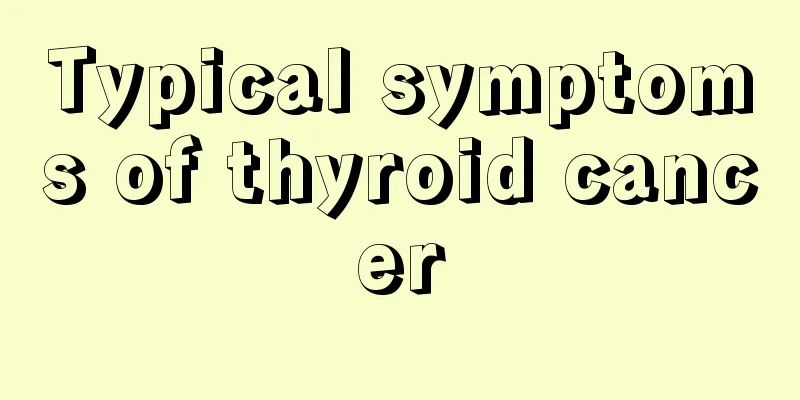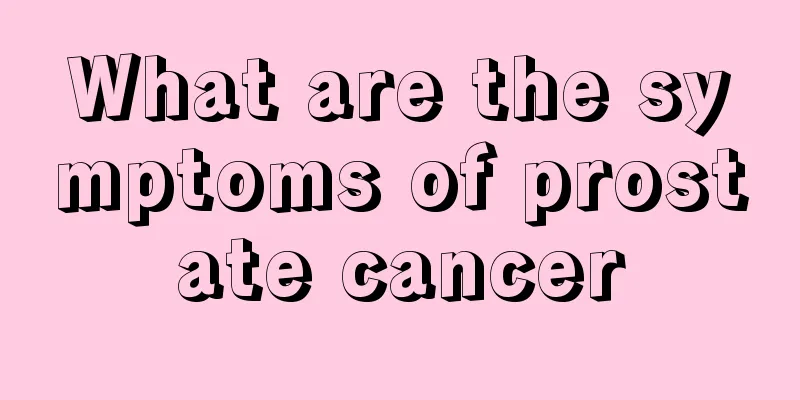Typical symptoms of thyroid cancer

|
Typical symptoms of thyroid cancer include neck lumps, hoarseness, and difficulty swallowing. There may be no obvious symptoms in the early stages, so it is recommended to seek medical attention in a timely manner. The occurrence of thyroid cancer is related to genetics, environment, physiological factors, trauma, and pathological changes. Treatment methods include surgery, drug therapy, and radioactive iodine therapy. 1. Neck lumps The most common symptom of thyroid cancer is a painless lump in the neck, usually in the thyroid area. The lump may gradually increase in size and become hard with unclear borders. If you find a lump in your neck, especially if it is accompanied by other symptoms, you should seek medical attention immediately for a definitive diagnosis through ultrasound, puncture biopsy, etc. 2. Hoarseness Thyroid cancer may compress or invade the recurrent laryngeal nerve, causing hoarseness. This symptom usually indicates that the tumor has developed to a certain stage, and imaging examinations such as CT or MRI are needed as soon as possible to assess the extent of the tumor. Hoarseness may also be a manifestation of other diseases and needs to be judged comprehensively in combination with other symptoms. 3. Dysphagia The enlargement of thyroid cancer may compress the esophagus, causing difficulty in swallowing. This symptom usually occurs with a neck mass, and the cause needs to be determined by endoscopy or imaging. Dysphagia may also be a manifestation of abnormal thyroid function or other neck diseases, which require further examination. Treatments for thyroid cancer include: Surgical treatment: Thyroidectomy is the main treatment method, and total or partial resection is selected according to the size and spread of the tumor. Medication: You may need to take thyroid hormone replacement medications, such as levothyroxine, after surgery to maintain normal metabolic function. Radioactive iodine therapy: For differentiated thyroid cancer, radioactive iodine is used to destroy any remaining cancer cells. The key to preventing thyroid cancer is regular physical examinations, especially for high-risk groups such as those with a family history or long-term exposure to radiation. Maintaining a healthy lifestyle, such as a balanced diet and avoiding excessive iodine intake or iodine deficiency, can also help reduce the risk. If symptoms such as a lump in the neck, hoarseness, or difficulty swallowing occur, you should seek medical attention in a timely manner. Early diagnosis and treatment are the key to improving the cure rate. |
<<: Can women with kidney cancer have children?
>>: Will nasal osteoma turn into cancer? How long can one live?
Recommend
What are the hazards of pubic lice to the human body
Speaking of lice, I believe many of my friends kn...
What is the reason for peeling nails?
If any of your friends find that the skin around ...
Can chestnuts not be soaked in wine? What are the taboos?
Chestnut is a common food in our daily life. It c...
What are the characteristics of comprehensive interventional treatment for liver cancer? Comprehensive analysis of comprehensive interventional treatment methods for liver cancer
Methods such as TACE and non-vascular interventio...
What is the reason for the pain in the middle of the chest
Pain in the center of the heart is a symptom that...
Can I still eat olive oil after it’s expired for several months?
Some families buy olive oil, but because they don...
Why is my chest so painful?
For women, breasts should not only be big but als...
What are the psychological care measures for bile duct cancer
What are the psychological care measures for bile...
How to wash silk fabrics?
In daily life, clothes made of silk fabrics are a...
How long does it take for ginger water to take effect when washing hair
According to folklore, ginger water is very effec...
Early symptoms of alcohol withdrawal
In our country, 70% of men drink alcohol. Drinkin...
How often should 3D B-ultrasound be performed?
The three-dimensional B-ultrasound that everyone ...
When I woke up, both sides of my face were very red
Everyone's physique is different. Some people...
Is there any hope for bile duct cancer with multiple metastases?
Is there any hope for bile duct cancer with multi...
Filter coffee
Many people love drinking coffee, especially when...









